AI Revolutionizes HR: Streamlining Recruitment and Talent Acquisition
Artificial intelligence is revolutionizing various sectors, and Human Resource Management is no exception. This article delves into how AI is transforming HR practices, particularly through the automation of administrative tasks, the enhancement of recruitment processes, and the improvement of talent acquisition strategies. By integrating AI, HR departments can not only streamline their operations but also reduce bias and enhance decision-making, leading to a more efficient and effective workforce.
Key Points
- AI adoption in HR automates administrative tasks, freeing up resources for more strategic work.
- AI improves recruitment by streamlining candidate sourcing, resume screening, and matching.
- AI can minimize bias in hiring, fostering fairness and equity.
- AI enables data-driven decision-making, enhancing overall HR management effectiveness.
- Gamification and virtual reality (VR) are emerging as innovative tools in AI-driven HR assessments.
The Role of AI in Human Resource Management
Adoption of AI in Administrative Task Automation
One of the first areas where AI is making significant strides is in the automation of administrative tasks. Many of the routine and repetitive duties in HR, such as data entry, scheduling, and document management, can be handled by AI-powered tools, saving time and reducing human error. Here's how AI can streamline these processes:
- Data Entry: AI algorithms can automate data entry into HR systems, improving accuracy and reducing manual effort.
- Scheduling: AI can manage scheduling for meetings, interviews, and appointments by analyzing calendars and suggesting the best times.
- Document Management: AI tools automate document creation, storage, and retrieval, making HR workflows more efficient.
- Email Management: AI can automate email responses, sort and categorize emails, and enhance communication efficiency.
- Reporting: AI can generate reports and dashboards automatically, providing real-time insights into HR metrics.
- Invoice Processing: AI simplifies invoice management, streamlining payments and maintaining accurate records.
- Reminders and Follow-ups: AI can set automatic reminders and conduct follow-ups, ensuring nothing falls through the cracks.
- Online Form Management: AI facilitates online form management, making it easier to access and automate tasks.
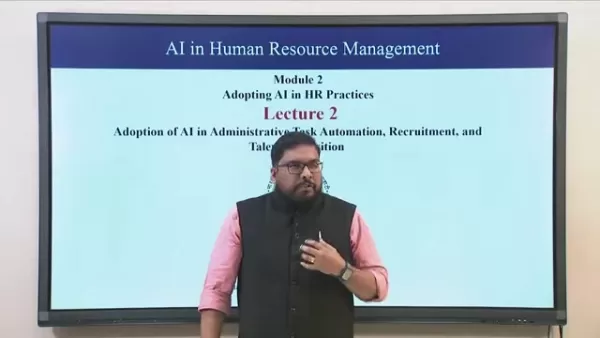
AI Transforming Recruitment and Talent Acquisition
AI is revolutionizing recruitment and talent acquisition by providing tools that make the process more efficient, less biased, and better at matching candidates to job requirements. This leads to improved hiring decisions and a more productive workforce. Here’s how AI is making a difference:
- Candidate Sourcing: AI tools analyze vast datasets to identify potential candidates from online profiles, resumes, and job postings.
- Resume Screening and Parsing: AI algorithms efficiently review resumes, extracting key information like skills, experience, and education.
- Enhanced Candidate Matching: AI matches candidates with job requirements more accurately, leading to better hiring decisions.
- Automating Routine Tasks: AI handles administrative duties, freeing up recruiters to focus on their core responsibilities.
- Predictive Analytics: AI can forecast a candidate’s potential success rate, aiding in better hiring choices.
- Bias Reduction: AI helps minimize bias, promoting fair and equitable hiring practices.
- Candidate Experience Enhancement: AI improves the candidate experience through timely communications and updates.
AI-powered online recruitment platforms offer several features to streamline the hiring process:
Feature Description Automated Scheduling AI manages interview scheduling, freeing HR representatives from this task. Real-Time Updates Notifies key personnel of any issues immediately. Customizable Templates Allows customization and utilization of various templates for different situations. Centralized Information Integrates all steps for better transparency and efficiency. Email & SMS Engages candidates and hiring managers with a mix of SMS and email notifications.
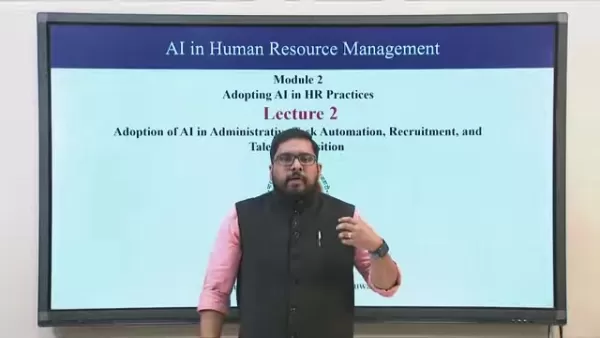
AI Tools for Administrative Automation
Workflow Automation Software
Workflow automation software, such as Jotform or Cflow, can be used to create automated workflows for various administrative functions. These platforms enable HR departments to design and implement automated processes for tasks like employee onboarding, performance management, and leave requests.
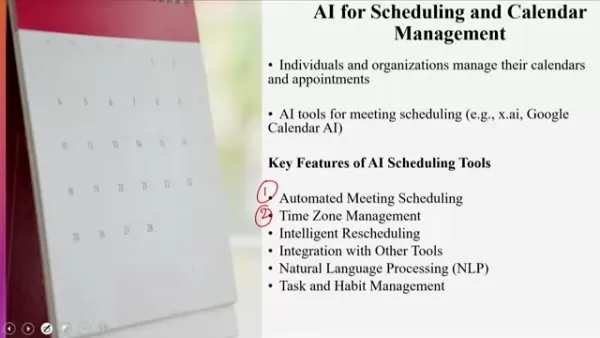
Intelligent Document Processing (IDP)
Intelligent Document Processing (IDP) tools can process documents using optical character recognition (OCR). These systems extract data from invoices and other scanned documents, streamlining document management.
Customer Relationship Management (CRM) Systems
CRM systems automate customer relationship management. They can be used to manage customer data and streamline communication processes, enhancing efficiency.
Harnessing AI for Scheduling and Calendar Management
Key Features of AI Scheduling Tools
AI can manage scheduling and calendars, making business operations smoother:
- Automated Meeting Scheduling: AI analyzes schedules and finds convenient times for meetings.
- Time Zone Management: AI automatically manages multiple time zones, simplifying global scheduling.
- Intelligent Rescheduling: AI ensures meetings are rescheduled efficiently and without errors.
- Integration with Other Tools: AI tools can integrate with various other platforms to enhance functionality.
- Natural Language Processing (NLP): NLP ensures smooth and cohesive use of AI scheduling tools.
- Task and Habit Management: AI helps schedule tasks in a way that supports productivity.
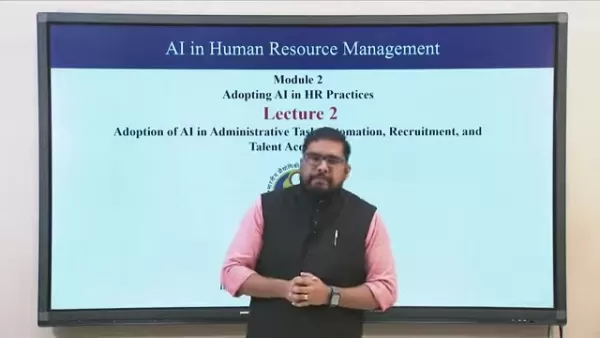
Pricing of AI Scheduling and Calendar Management
Pricing and Products
Pricing for AI scheduling and calendar management tools can vary, as there are numerous options available. However, these tools are designed to boost productivity and efficiency, making them a worthwhile investment for many organizations.
Adopting AI in HR: Weighing the Benefits and Challenges
Pros
- Increased Efficiency: Automates repetitive administrative tasks, freeing up time for strategic work.
- Reduced Bias: Minimizes human bias in candidate selection, promoting fairness.
- Enhanced Candidate Matching: Improves accuracy in matching candidates with job requirements.
- Data-Driven Decisions: Enables HR to make decisions based on real-time data and analytics.
- Improved Candidate Experience: Provides timely communication and guidance throughout the hiring process.
Cons
- Data Privacy Concerns: Requires strict adherence to data protection regulations.
- Quality of Data: Effectiveness relies on high-quality data for training algorithms.
- Resistance to Change: Employees may be hesitant to adopt new technologies.
- Ethical Considerations: Ensures AI systems do not perpetuate existing biases or discrimination.
Use Cases of AI in Administrative Task Automation
Examples to Use AI and Administrative Task Automation
Implementing AI to automate administrative tasks can bring numerous benefits. Here are some practical examples:
- Automated Meeting Scheduling: Streamlines and automates the process of scheduling interviews and meetings, optimizing time and resources.
- Data Entry Streamlining: Automates data entry to improve efficiency, accuracy, and processing times.
- Document Management Streamlining: Automates the document management system, reducing costs and human error.

FAQ
What are the key benefits of adopting AI in HR?
The key benefits include improved efficiency, reduced bias, enhanced candidate matching, data-driven decision-making, and streamlined administrative processes.
How can AI reduce bias in recruitment?
AI can reduce bias by focusing on predefined skills and qualifications rather than demographic factors, promoting a more equitable hiring process.
What are some AI tools used in recruitment?
Some AI tools used in recruitment include Qureos (Iris), Manatal, LinkedIn Recruiter, Holly, and Fetcher.ai. These tools offer functionalities like candidate sourcing, resume screening, and automated communication.
What is hyper-automation in the context of HR?
Hyper-automation involves combining AI, robotic process automation (RPA), and machine learning to automate end-to-end processes with minimal human intervention.
Why is blockchain technology important in AI-driven recruitment?
Blockchain technology offers a secure and decentralized way to verify candidate credentials and work history, reducing the risk of CV fraud and streamlining the verification process.
Related Questions
What are the key future trends in AI-driven recruitment?
The future of AI-driven recruitment is set to be shaped by several trends:
- Synergy Between Recruiters and AI: AI augments recruiters' abilities, allowing them to focus on strategic tasks and build relationships with candidates.
- Gamification and Virtual Reality (VR) in Assessments: VR and gamification provide immersive experiences for candidates, allowing for more effective evaluations.
- AI-Powered Candidate Screening: AI streamlines resume screening, improving hiring pace and equity.
- Chatbots for Initial Interactions: Chatbots provide instant responses to common applicant questions, enhancing candidate experience.
- Predictive Analytics for Better Hiring Decisions: Predictive analytics use past performance metrics to improve hiring accuracy.
- Automated Interview Scheduling: AI saves time by automating and reorganizing interview schedules.
- Integration of Blockchain Technology: Blockchain is used for transparency and credential verification, ensuring accuracy.
These trends indicate a shift towards more efficient, data-driven, and candidate-centric recruitment processes. As organizations embrace these technologies, they can expect to attract and retain top talent more effectively while enhancing the overall hiring experience.
Related article
 Master Audio Editing in DaVinci Resolve: Fairlight Guide for Professional Sound
Crystal-clear audio separates amateur productions from professional video content. DaVinci Resolve's Fairlight page provides filmmakers and content creators with sophisticated tools to perfect their sound design. This in-depth tutorial walks through
Master Audio Editing in DaVinci Resolve: Fairlight Guide for Professional Sound
Crystal-clear audio separates amateur productions from professional video content. DaVinci Resolve's Fairlight page provides filmmakers and content creators with sophisticated tools to perfect their sound design. This in-depth tutorial walks through
 Google's AI Now Handles Phone Calls for You
Google has expanded its AI calling feature to all US users through Search, enabling customers to inquire about pricing and availability with local businesses without phone conversations. Initially tested in January, this capability currently supports
Google's AI Now Handles Phone Calls for You
Google has expanded its AI calling feature to all US users through Search, enabling customers to inquire about pricing and availability with local businesses without phone conversations. Initially tested in January, this capability currently supports
 Trump Exempts Smartphones, Computers, and Chips from Tariff Hikes
The Trump administration has granted exclusions for smartphones, computers, and various electronic devices from recent tariff increases, even when imported from China, according to Bloomberg reporting. However, these products remain subject to earlie
Comments (3)
0/200
Trump Exempts Smartphones, Computers, and Chips from Tariff Hikes
The Trump administration has granted exclusions for smartphones, computers, and various electronic devices from recent tariff increases, even when imported from China, according to Bloomberg reporting. However, these products remain subject to earlie
Comments (3)
0/200
![LarryMartinez]() LarryMartinez
LarryMartinez
 August 12, 2025 at 5:00:59 PM EDT
August 12, 2025 at 5:00:59 PM EDT
This AI stuff in HR sounds like a game-changer! Automating all that boring paperwork? Count me in! 😎 But I wonder, does it make hiring too impersonal?


 0
0
![JeffreyRamirez]() JeffreyRamirez
JeffreyRamirez
 August 11, 2025 at 1:00:59 AM EDT
August 11, 2025 at 1:00:59 AM EDT
This AI stuff in HR sounds cool, but I wonder if it’ll make hiring too robotic? 🤖 Still, automating boring tasks could free up time for real human connection in recruitment!


 0
0
![JohnYoung]() JohnYoung
JohnYoung
 August 4, 2025 at 2:48:52 AM EDT
August 4, 2025 at 2:48:52 AM EDT
AI in HR sounds like a game-changer! Automating the boring stuff like screening resumes is cool, but I wonder if it’ll make hiring too impersonal. 🤔 Still, super curious to see how it evolves!


 0
0
Artificial intelligence is revolutionizing various sectors, and Human Resource Management is no exception. This article delves into how AI is transforming HR practices, particularly through the automation of administrative tasks, the enhancement of recruitment processes, and the improvement of talent acquisition strategies. By integrating AI, HR departments can not only streamline their operations but also reduce bias and enhance decision-making, leading to a more efficient and effective workforce.
Key Points
- AI adoption in HR automates administrative tasks, freeing up resources for more strategic work.
- AI improves recruitment by streamlining candidate sourcing, resume screening, and matching.
- AI can minimize bias in hiring, fostering fairness and equity.
- AI enables data-driven decision-making, enhancing overall HR management effectiveness.
- Gamification and virtual reality (VR) are emerging as innovative tools in AI-driven HR assessments.
The Role of AI in Human Resource Management
Adoption of AI in Administrative Task Automation
One of the first areas where AI is making significant strides is in the automation of administrative tasks. Many of the routine and repetitive duties in HR, such as data entry, scheduling, and document management, can be handled by AI-powered tools, saving time and reducing human error. Here's how AI can streamline these processes:
- Data Entry: AI algorithms can automate data entry into HR systems, improving accuracy and reducing manual effort.
- Scheduling: AI can manage scheduling for meetings, interviews, and appointments by analyzing calendars and suggesting the best times.
- Document Management: AI tools automate document creation, storage, and retrieval, making HR workflows more efficient.
- Email Management: AI can automate email responses, sort and categorize emails, and enhance communication efficiency.
- Reporting: AI can generate reports and dashboards automatically, providing real-time insights into HR metrics.
- Invoice Processing: AI simplifies invoice management, streamlining payments and maintaining accurate records.
- Reminders and Follow-ups: AI can set automatic reminders and conduct follow-ups, ensuring nothing falls through the cracks.
- Online Form Management: AI facilitates online form management, making it easier to access and automate tasks.

AI Transforming Recruitment and Talent Acquisition
AI is revolutionizing recruitment and talent acquisition by providing tools that make the process more efficient, less biased, and better at matching candidates to job requirements. This leads to improved hiring decisions and a more productive workforce. Here’s how AI is making a difference:
- Candidate Sourcing: AI tools analyze vast datasets to identify potential candidates from online profiles, resumes, and job postings.
- Resume Screening and Parsing: AI algorithms efficiently review resumes, extracting key information like skills, experience, and education.
- Enhanced Candidate Matching: AI matches candidates with job requirements more accurately, leading to better hiring decisions.
- Automating Routine Tasks: AI handles administrative duties, freeing up recruiters to focus on their core responsibilities.
- Predictive Analytics: AI can forecast a candidate’s potential success rate, aiding in better hiring choices.
- Bias Reduction: AI helps minimize bias, promoting fair and equitable hiring practices.
- Candidate Experience Enhancement: AI improves the candidate experience through timely communications and updates.
AI-powered online recruitment platforms offer several features to streamline the hiring process:
| Feature | Description |
|---|---|
| Automated Scheduling | AI manages interview scheduling, freeing HR representatives from this task. |
| Real-Time Updates | Notifies key personnel of any issues immediately. |
| Customizable Templates | Allows customization and utilization of various templates for different situations. |
| Centralized Information | Integrates all steps for better transparency and efficiency. |
| Email & SMS | Engages candidates and hiring managers with a mix of SMS and email notifications. |

AI Tools for Administrative Automation
Workflow Automation Software
Workflow automation software, such as Jotform or Cflow, can be used to create automated workflows for various administrative functions. These platforms enable HR departments to design and implement automated processes for tasks like employee onboarding, performance management, and leave requests.

Intelligent Document Processing (IDP)
Intelligent Document Processing (IDP) tools can process documents using optical character recognition (OCR). These systems extract data from invoices and other scanned documents, streamlining document management.
Customer Relationship Management (CRM) Systems
CRM systems automate customer relationship management. They can be used to manage customer data and streamline communication processes, enhancing efficiency.
Harnessing AI for Scheduling and Calendar Management
Key Features of AI Scheduling Tools
AI can manage scheduling and calendars, making business operations smoother:
- Automated Meeting Scheduling: AI analyzes schedules and finds convenient times for meetings.
- Time Zone Management: AI automatically manages multiple time zones, simplifying global scheduling.
- Intelligent Rescheduling: AI ensures meetings are rescheduled efficiently and without errors.
- Integration with Other Tools: AI tools can integrate with various other platforms to enhance functionality.
- Natural Language Processing (NLP): NLP ensures smooth and cohesive use of AI scheduling tools.
- Task and Habit Management: AI helps schedule tasks in a way that supports productivity.

Pricing of AI Scheduling and Calendar Management
Pricing and Products
Pricing for AI scheduling and calendar management tools can vary, as there are numerous options available. However, these tools are designed to boost productivity and efficiency, making them a worthwhile investment for many organizations.
Adopting AI in HR: Weighing the Benefits and Challenges
Pros
- Increased Efficiency: Automates repetitive administrative tasks, freeing up time for strategic work.
- Reduced Bias: Minimizes human bias in candidate selection, promoting fairness.
- Enhanced Candidate Matching: Improves accuracy in matching candidates with job requirements.
- Data-Driven Decisions: Enables HR to make decisions based on real-time data and analytics.
- Improved Candidate Experience: Provides timely communication and guidance throughout the hiring process.
Cons
- Data Privacy Concerns: Requires strict adherence to data protection regulations.
- Quality of Data: Effectiveness relies on high-quality data for training algorithms.
- Resistance to Change: Employees may be hesitant to adopt new technologies.
- Ethical Considerations: Ensures AI systems do not perpetuate existing biases or discrimination.
Use Cases of AI in Administrative Task Automation
Examples to Use AI and Administrative Task Automation
Implementing AI to automate administrative tasks can bring numerous benefits. Here are some practical examples:
- Automated Meeting Scheduling: Streamlines and automates the process of scheduling interviews and meetings, optimizing time and resources.
- Data Entry Streamlining: Automates data entry to improve efficiency, accuracy, and processing times.
- Document Management Streamlining: Automates the document management system, reducing costs and human error.

FAQ
What are the key benefits of adopting AI in HR?
The key benefits include improved efficiency, reduced bias, enhanced candidate matching, data-driven decision-making, and streamlined administrative processes.
How can AI reduce bias in recruitment?
AI can reduce bias by focusing on predefined skills and qualifications rather than demographic factors, promoting a more equitable hiring process.
What are some AI tools used in recruitment?
Some AI tools used in recruitment include Qureos (Iris), Manatal, LinkedIn Recruiter, Holly, and Fetcher.ai. These tools offer functionalities like candidate sourcing, resume screening, and automated communication.
What is hyper-automation in the context of HR?
Hyper-automation involves combining AI, robotic process automation (RPA), and machine learning to automate end-to-end processes with minimal human intervention.
Why is blockchain technology important in AI-driven recruitment?
Blockchain technology offers a secure and decentralized way to verify candidate credentials and work history, reducing the risk of CV fraud and streamlining the verification process.
Related Questions
What are the key future trends in AI-driven recruitment?
The future of AI-driven recruitment is set to be shaped by several trends:
- Synergy Between Recruiters and AI: AI augments recruiters' abilities, allowing them to focus on strategic tasks and build relationships with candidates.
- Gamification and Virtual Reality (VR) in Assessments: VR and gamification provide immersive experiences for candidates, allowing for more effective evaluations.
- AI-Powered Candidate Screening: AI streamlines resume screening, improving hiring pace and equity.
- Chatbots for Initial Interactions: Chatbots provide instant responses to common applicant questions, enhancing candidate experience.
- Predictive Analytics for Better Hiring Decisions: Predictive analytics use past performance metrics to improve hiring accuracy.
- Automated Interview Scheduling: AI saves time by automating and reorganizing interview schedules.
- Integration of Blockchain Technology: Blockchain is used for transparency and credential verification, ensuring accuracy.
These trends indicate a shift towards more efficient, data-driven, and candidate-centric recruitment processes. As organizations embrace these technologies, they can expect to attract and retain top talent more effectively while enhancing the overall hiring experience.
 Master Audio Editing in DaVinci Resolve: Fairlight Guide for Professional Sound
Crystal-clear audio separates amateur productions from professional video content. DaVinci Resolve's Fairlight page provides filmmakers and content creators with sophisticated tools to perfect their sound design. This in-depth tutorial walks through
Master Audio Editing in DaVinci Resolve: Fairlight Guide for Professional Sound
Crystal-clear audio separates amateur productions from professional video content. DaVinci Resolve's Fairlight page provides filmmakers and content creators with sophisticated tools to perfect their sound design. This in-depth tutorial walks through
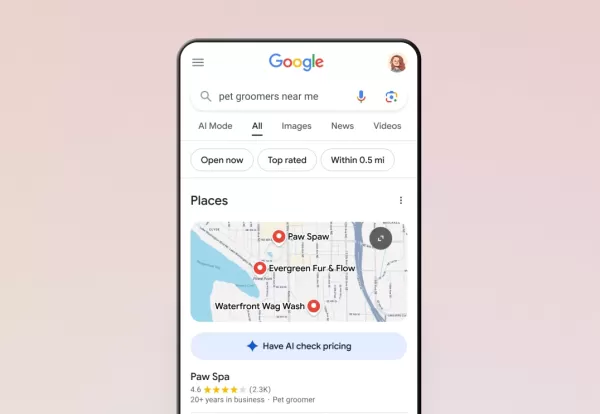 Google's AI Now Handles Phone Calls for You
Google has expanded its AI calling feature to all US users through Search, enabling customers to inquire about pricing and availability with local businesses without phone conversations. Initially tested in January, this capability currently supports
Google's AI Now Handles Phone Calls for You
Google has expanded its AI calling feature to all US users through Search, enabling customers to inquire about pricing and availability with local businesses without phone conversations. Initially tested in January, this capability currently supports
 Trump Exempts Smartphones, Computers, and Chips from Tariff Hikes
The Trump administration has granted exclusions for smartphones, computers, and various electronic devices from recent tariff increases, even when imported from China, according to Bloomberg reporting. However, these products remain subject to earlie
Trump Exempts Smartphones, Computers, and Chips from Tariff Hikes
The Trump administration has granted exclusions for smartphones, computers, and various electronic devices from recent tariff increases, even when imported from China, according to Bloomberg reporting. However, these products remain subject to earlie
 August 12, 2025 at 5:00:59 PM EDT
August 12, 2025 at 5:00:59 PM EDT
This AI stuff in HR sounds like a game-changer! Automating all that boring paperwork? Count me in! 😎 But I wonder, does it make hiring too impersonal?


 0
0
 August 11, 2025 at 1:00:59 AM EDT
August 11, 2025 at 1:00:59 AM EDT
This AI stuff in HR sounds cool, but I wonder if it’ll make hiring too robotic? 🤖 Still, automating boring tasks could free up time for real human connection in recruitment!


 0
0
 August 4, 2025 at 2:48:52 AM EDT
August 4, 2025 at 2:48:52 AM EDT
AI in HR sounds like a game-changer! Automating the boring stuff like screening resumes is cool, but I wonder if it’ll make hiring too impersonal. 🤔 Still, super curious to see how it evolves!


 0
0





























